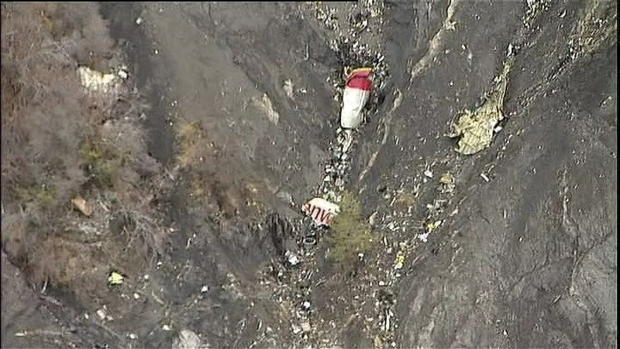Airline boss offers crash victims help, but no answers
MONTABAUR, Germany -- The CEOs of Germanwings and its parent company Lufthansa arrived by helicopter Wednesday morning at Syne-les-Alpes, close to the site where prosecutors say Germanwings co-pilot Andreas Lubitz deliberately flew an Airbus A320 into a mountainside in the French Alps on March 24, killing himself and 149 other people on board.
Standing near a memorial erected at Syene-les-Alpes to the victims of the disaster, Lufthansa CEO Carsten Spohr said he, like everyone else, was "learning more every day about the causes of the accident."
"It will take a long, long time for everybody, all of us to understand how this could happen," added Spohr.
He promised his company's support to the victims' families.
"I would like to give my word to the victims that we don't only help this week, we want to help as long as help is needed," Spohr said. "We are very, very sorry that such a terrible accident could have happened."
Neither Spohr nor Germanwings CEO Thomas Winkelmann took any questions from the gathered media after Spohr read his brief statement, and a day after Lufthansa admitted that it knew Lubitz had suffered severe mental illness years ago, those questions were mounting.
CBS News correspondent Allen Pizzey says investigators believe the grim process of collecting human remains from the steep mountainside was complete, but they were to continue searching as the wreckage was slowly removed -- a process that could take months.
The airliner was virtually pulverized when Lubitz flew it into the mountainside at 430 miles per hour, likely killing all 150 people on board instantly. Investigators believe he acted deliberately, but they are still trying to figure out exactly why.
Lufthansa admitted Tuesday that Lubitz had told the airline when he resumed his flight training in 2009 that he had suffered a "serious depressive episode," and said medical and training documents had been handed over to prosecutors.
Normally medical records are confidential under Germany's stringent privacy laws. Breaching those laws is only required if there is believed to be an immediate danger to the individual or the public.
According the European Aviation Safety Agency, conditions that preclude a pilot from flying include acute and chronic psychological diseases, acute sleep disorders, eyesight issues, drug and alcohol abuse and schizophrenia.
Shortly after the crash Lufthansa CEO Spohr said Lubitz was "one hundred percent airworthy without any restrictions."
Since then Lufthansa has told its insurers to set aside some $300 million to deal with "all costs arising in connection with the case."
A French magazine and a German newspaper claim to have seen a cell phone video allegedly shot by a passenger in the airliner during the chaotic last moments of the doomed flight.
French police initially denied it, with a high ranking official involved in the recovery operation categorically denying any cell phone footage had been found by investigators at the site, but Wednesday morning prosecutors said if there is a video, it must be handed over to officials.
